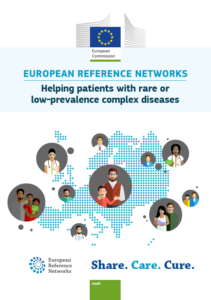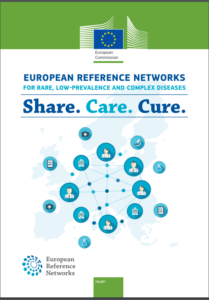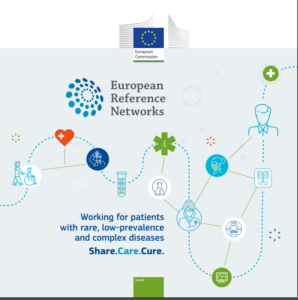The first 24 European Reference Networks (ERNs) on Rare Diseases have been approved by the ERN Board of Member States (BoMS) in December 2016, following the first EU Call for proposal for the creation of ERNs (European Commission, DG Health, March 2016).
Following an assessment conducted by an Independant Assessment Body and the approval of the BoMS, the ERNs have received the ERN label for their first 5 years of operation, and have been officially launched in March 2017.
The ERNs are co-funded by the 3rd Health Programme of the European Union.
24 European Reference Networks on rare diseases
The European Reference Networks (ERNs) for Rare and Low Prevalence Complex Diseases are virtual networks involving healthcare providers across Europe. They gather the best expertise to improve care in Rare Diseases in Europe. They aim to tackle complex or rare diseases and conditions that require highly specialised treatment and a concentration of knowledge and resources
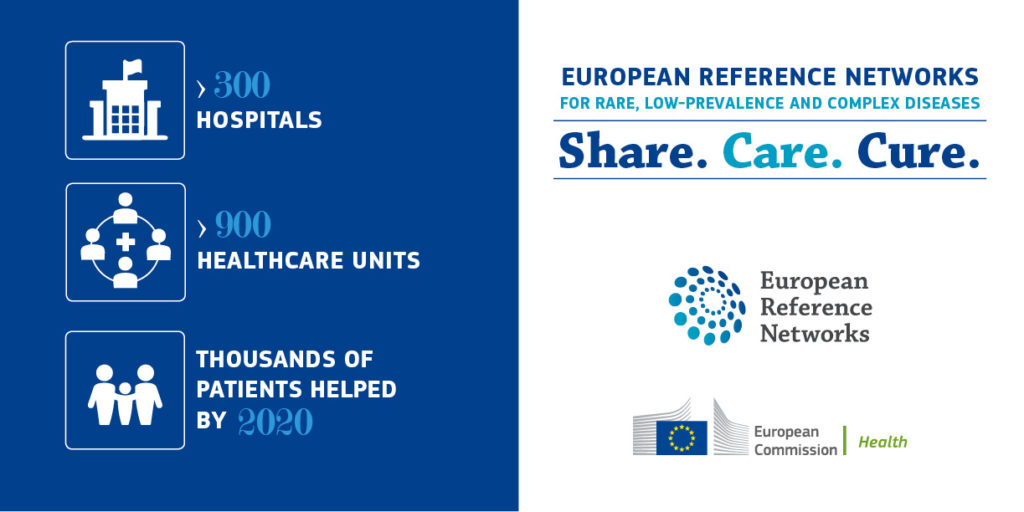
- 24 ERNs covering all major Rare Disease groups – this link includes 1 factsheet per ERNs
- involving 25 European Union countries plus Norway
- More than 300 hospitals
- Over 900 highly specialised healthcare units
- High cooperation and involvement of pan-European and national Patient Organisations, through the European Patient Advocacy Groups (ePAGs)
List of the 24 ERNs with their websites
The ERNs aim to facilitate and improve access to diagnosis and treatment in rare or low prevalence complex diseases or conditions by pooling existing highly specialised Healthcare Providers/Centers of Excellence across the EU. They will share knowledge, experience, medical research, teaching, training, resources and use relevant communication and eHealth tools to make expertise travel rather than the patients. This will also reduce inequalities of treatment within the EU.
Interview of Vytenis Andriukaitis, European Commissioner for Health and Food Safety
“The value of EU collaboration is particularly clear in the case of rare and complex diseases. […] How can ERNs improve the lives of Europeans?
Patients with rare and complex conditions will be able to benefit from the best treatment and advice available for their specific condition. Their doctors will have access to a highly-specialised pool of colleagues from all over Europe.
In the first phase, over 900 healthcare units will work together in 24 thematic networks, ranging from childhood cancer to immunodeficiency.”
What is an ERN?
“A network connecting health care providers and centres of expertise of highly specialised healthcare, for the purpose of improving access to diagnosis, treatment and the provision of high-quality healthcare for patients with conditions requiring a particular concentration of resources or expertise no matter where they are in Europe. For clinicians who network widely already, the ERN will represent the formalisation of their networking structures/practices in highly specialized healthcare. For those without specialist networking communities at present, ERNs will promote expertise and support health care providers in order to bring local, regional and national provision of healthcare closer to the patients.” (European Commission FAQs
ERN Flyers 2019 : Helping patients with rare or low-prevalence complex diseases :
ERN Posters 2019 : Helping patients with rare or low-prevalence complex diseases :
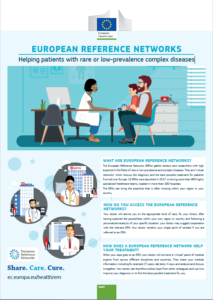
ERNs Flyer (2017)
ERNs Brochure (2017)
European Commission ERN Policy
European Commission FAQ on ERNs
ERNs Launch Press Release (in all EU official languages)
Information flyer for patients and healthcare professionals on ERNs (EN)
CHAFEA publication on EU health programme support to ERNs (EN)
ERN information video playlist on the VASCERN YouTube Channel
Legislative background
Directive 2011/24/EU on the application of patients’ rights in cross-border healthcare
European reference networks shall have at least three of the following objectives (Article 12.2)
| (a) to help realise the potential of European cooperation regarding highly specialised healthcare for patients and for healthcare systems by exploiting innovations in medical science and health technologies; (b) to contribute to the pooling of knowledge regarding sickness prevention; (c) to facilitate improvements in diagnosis and the delivery of high-quality, accessible and cost effective healthcare for all patients with a medical condition requiring a particular concentration of expertise in medical domains where expertise is rare; (d) to maximise the cost-effective use of resources by concentrating them where appropriate; | (e) to reinforce research, epidemiological surveillance like registries and provide training for health professionals; (f) to facilitate mobility of expertise, virtually or physically, and to develop, share and spread information, knowledge and best practice and to foster developments of the diagnosis and treatment of rare diseases, within and outside the networks; (g) to encourage the development of quality and safety benchmarks and to help develop and spread best practice within and outside the network; (h) to help Member States with an insufficient number of patients with a particular medical condition or lacking technology or expertise to provide highly specialised services of high quality. |
Commission Implementing Decision




